As a blogger or digital creator, it’s not uncommon to add paid ads to your work to help earn revenue. Paid ads help creators earn extra income from content that they’re already creating.
In other words, you get more pay for the same amount of work — talk about a great deal!
Unfortunately, many people get into legal trouble for this.
Why? Because they didn’t clearly state that the promotion was for some form of compensation. Oopsy!
One way to get around these types of issues is by creating advertising disclaimers. It helps remove liability from promoters when making claims.
To help you avoid common legal pitfalls while increasing your revenue, it pays to know a bit about advertising disclaimers.
In this article, you’ll learn what they are, why they matter, and how to create one for your business.
Before we get into the nitty-gritty of laws surrounding advertising disclaimers, let’s start with the basics.
Table of Contents
PRO TIP: Take the hassle of writing your own disclaimer away with our disclaimer generator trusted by over 200,000 businesses. It’ll save you hours of work and possible costly legal mistakes.
What is an Advertising Disclaimer?
An advertising disclaimer serves as an informational statement to consumers. It tells viewers that you got some sort of compensation to post the ad.
These types of disclaimers help consumers make unbiased purchasing decisions. They also remove legal liability from the business or promoter.
That way, if someone isn’t happy with their purchase, you’re not to blame.
Why Do You Need an Advertising Disclaimer?
In order to comply with FTC regulation policies, content creators are required by law to disclaim any affiliate marketing and brand partnerships that they participate in.
This falls under the FTC’s common sense rule, which states that you should use common sense when choosing when to disclose information. So, you need a disclaimer if you want to stay in good standing with the law.
Besides avoiding civil court proceedings against the Federal Trade Commission, advertising disclaimers also protect your business by removing legal liability surrounding a customer’s purchase. In other words, they tell a customer you’re not responsible for making them buy the product.
This removes the blame from the person selling the product. Instead, it puts the responsibility for the purchase of the product on the consumer. This can help keep people running ads out of any trouble in the event that things go awry with a customer’s purchase.
Aside from legal matters, advertising disclaimers also benefit potential customers. They provide a more complete story about a brand’s service or product. They help give a customer some insight into why a person or business is endorsing something.
Another reason it’s important to use disclaimers is that everyone is different. In other words, what works for you might not work for someone else.
So, even though you might have given an honest product review based on your experience, what another person experiences will depend on their own body, situation, environment, and other factors.
A disclosure statement makes this clear. That way, you can’t be sued for providing false promises just because something worked for you.
So, these disclaimers serve many purposes. They add a layer of protection for the consumer and the business selling a product.
Advertising Disclaimer Examples You Can Learn From
If you’re still confused about what an advertising disclaimer is, don’t panic. Let’s take a look at the following examples to give you a better idea of what these are all about.
SAGE Publishing
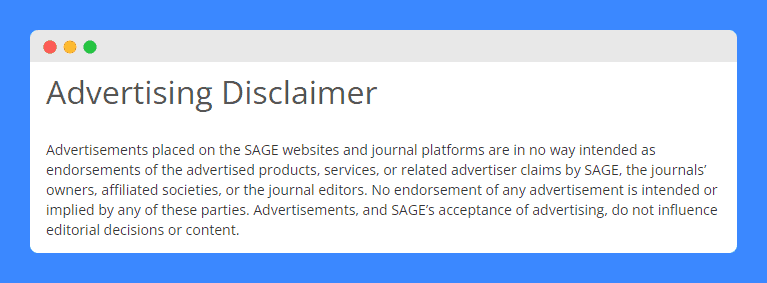
One good example of an advertising disclaimer is that of SAGE Publishing.
Their disclosure states that they’re not responsible for what ads on their site say.
One thing that’s great about this disclaimer is that it’s straightforward and concise. It promotes understanding between the business and the potential visitors of the site.
The advertising disclosure by SAGE also prevents confusion from any party. It makes it very clear who is responsible for the claims made by ads on the site. Plus, it shuts down any opportunity for consumers to sue SAGE.
Weight Loss Direct
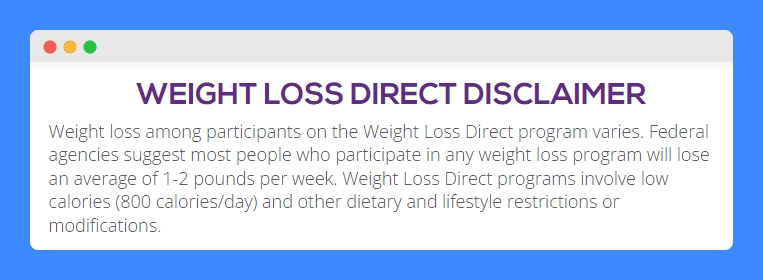
Another advertising disclaimer example is that of Weight Loss Direct. Disclaimers are actually very handy in the weight loss industry. This is mainly because different people will react differently to fitness programs.
This site’s disclosure says the results of its program can vary among individuals. It also provides additional recommendations to help consumers achieve weight loss. This helps remove the legal burden from the company if their product doesn’t produce results.
Mommies of Miracles
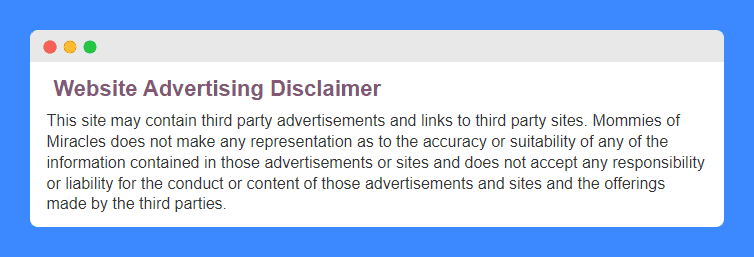
Finally, let’s look at the company Mommies of Miracles. In its disclaimer, the company states that it’s not accountable for the contents of ads on its site.
Since the site runs ads to earn revenue, people may think the site endorses those products. With this disclaimer, however, they make it clear that the ads are independent. As a result, they put the legal burden on the advertiser and not Mommies of Miracles.
Sample Advertising Disclaimer Template
This sample template will help you with crafting your own advertising disclaimer. Keep in mind that this is just an example of the advertising clause and your disclaimer should outline many other important topics to be legally protected.
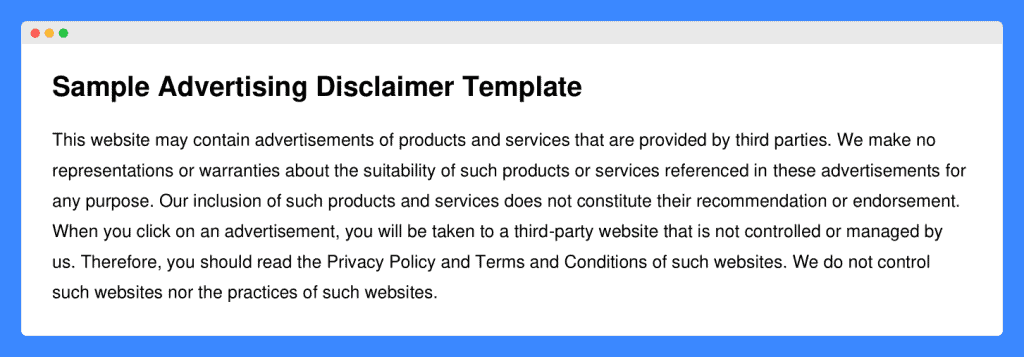
How to Write Your Own Advertising Disclaimer?
Now that you know how important advertising disclaimers are, it’s time to sit down and write one yourself. Doing so could help save you from some pretty serious legal battles down the road!
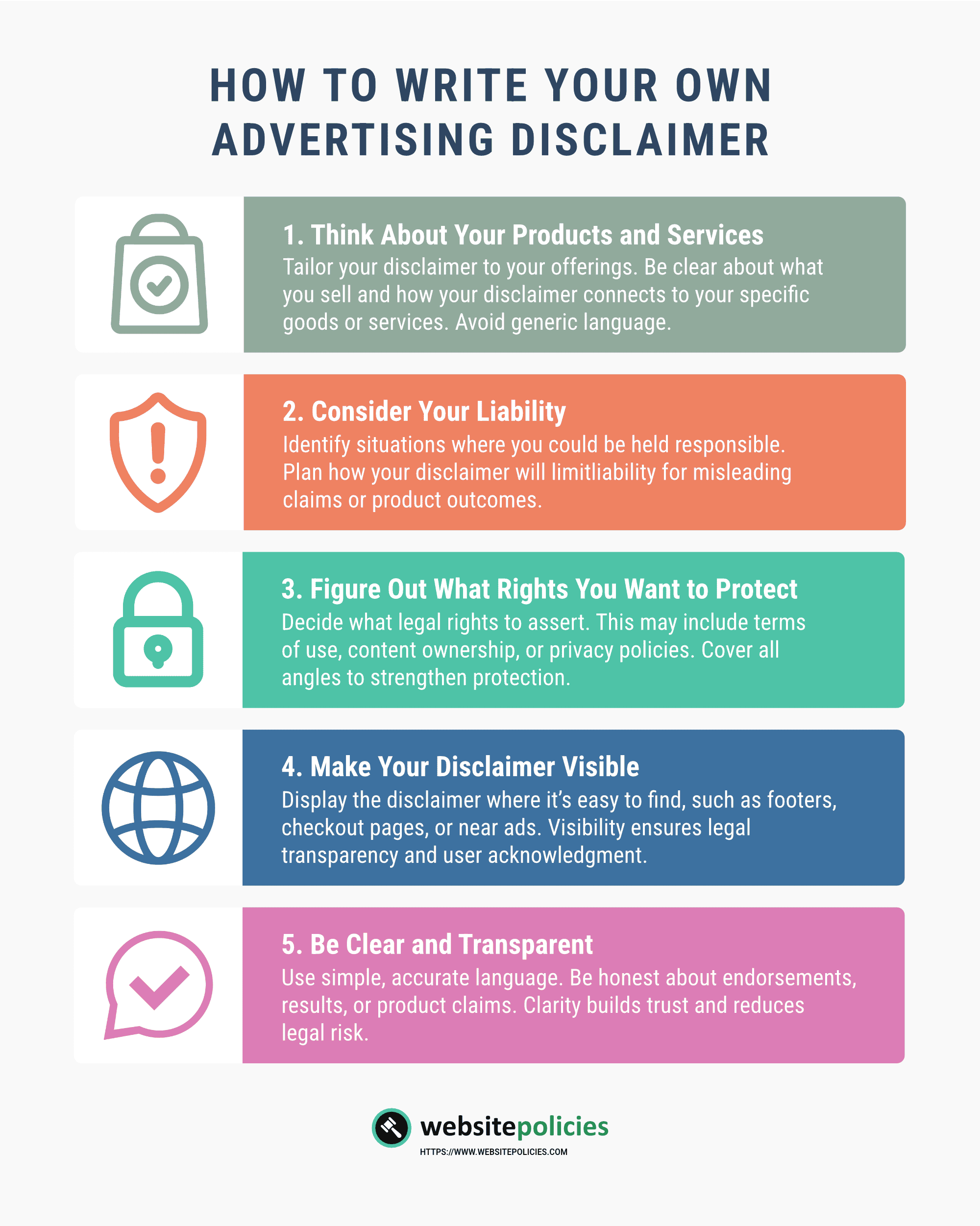
Think About Your Products and Services
The first step to writing an effective advertising disclaimer is to connect it with your products or services.
Keep in mind that disclaimers will be different among brands and websites. Make sure that it’s tailored to the goods or services you offer to your clients.
While your disclaimer won’t be a carbon copy of your competitor’s, it should have one similarity: accurate and transparent information. Make sure that your disclaimer clearly states things like responsibility.
Consider Your Liability
Once you’ve connected your business’s products and services to your disclaimer, it’s time to think about liability.
Make a list of the possible circumstances in which you could be held liable for the claims you’re making. Identify these, and have a plan of action on how to cover and include them in your disclaimer.
Figure Out What Rights You Want to Protect
You’ll want to consider what rights you intend to protect with your advertising disclaimer. Don’t forget to include terms and conditions, as well as a privacy policy to get all legal angles covered.
Make Your Disclaimer Visible
Visibility is key for any legal policies you may have on your blog. Place your advertising disclaimer somewhere that’s visible to the public so that there can be no dispute as to whether or not you made one.
Frequently Asked Questions
Do I need to disclose ads on social media?
Yes, the requirement to disclose ads on social media (such as Instagram, Facebook, YouTube, TikTok, etc) is no different than having a disclaimer on your blog or website.
What are the penalties when ad disclaimers are deceptive?
In the United States, the first penalty is usually a cease and desist order. There’s also a fine of over $40K if the ad shows up again. Remember, these penalties can vary based on your locality, state, and country, so make sure to read local laws to stay compliant.
Can I copy a disclaimer from another website?
You can certainly copy another website’s advertising disclaimer. However, keep in mind that it may contain information that’s irrelevant to you or even completely wrong.
Can you still be sued even with an advertising disclaimer?
You can still get sued even if you have an advertising disclaimer. This is especially true if your disclaimer is ambiguous so make sure to write yours correctly. Having a valid disclaimer will help you protect yourself from such frivolous suits.



